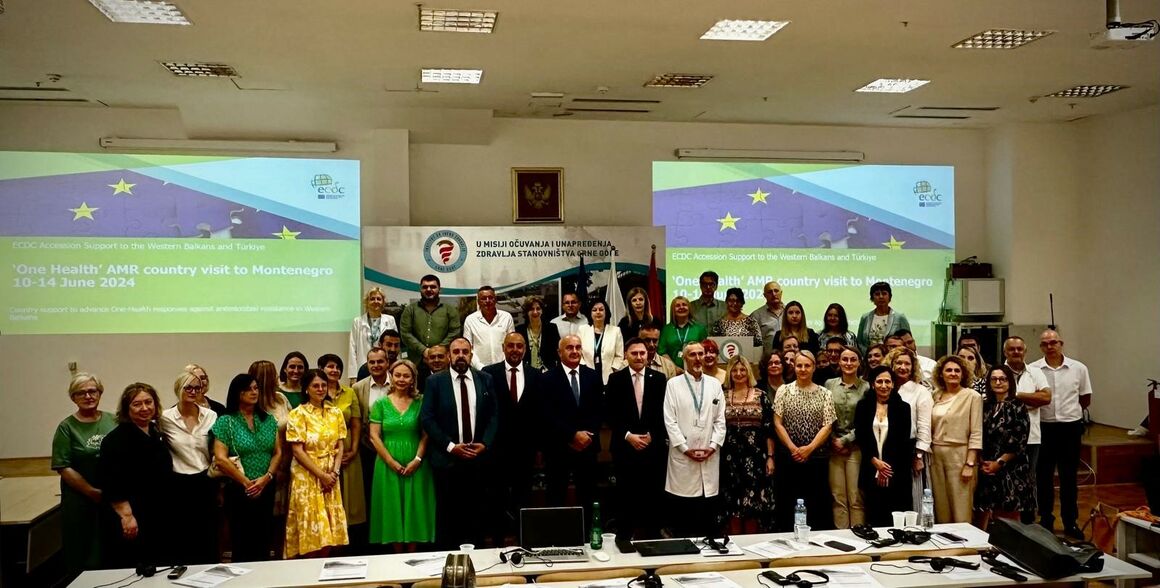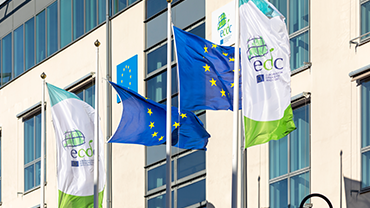One Health responses against AMR: ECDC/EC/EFSA country visit to Montenegro
From 10–14 June 2024, a team of experts from the European Commission (EC), the European Centre for Disease Prevention and Control (ECDC), the European Food Safety Authority (EFSA), Epiconcept, the Integrated Quality Laboratory Services (IQLS), and Spain visited Montenegro to discuss AMR issues in a One Health perspective.

Antibiotic resistance (AMR) represents one of the most significant public health challenges in Europe and around the world. Over 35 000 people die from infections with antimicrobial-resistant bacteria annually in the European Union/European Economic Area (EU/EEA).
The five-day visit to Montenegro constituted the third in a series of country visits to the Western Balkans, which all aim to contribute to the advancement of a One Health approach against the spread of antibiotic resistance (AMR) in the region.
In collaboration with national public health, animal health and food safety authorities, the team reflected on the work carried out by Montenegro on surveillance, prevention, and control of AMR.The meeting was opened by the Minister of Health, Dr Vojislav Šimun; the Minister of Agriculture, Forestry, and Water Management, Mr Vladimir Joković; the State Secretary in the Ministry of Tourism, Ecology, Sustainable Development, and Northern Region Development, Mr Nenad Vitomirović; and the Director of the Institute for Public Health of Montenegro, Prof Dr Dragan Lausevic.
The country visit experts were divided into two teams, one led by ECDC and the other by DG SANTE and EFSA. The teams met with representatives and stakeholders from key national authorities and institutions. They also visited hospitals, healthcare facilities, pharmacies, laboratories, and long-term care facilities, and met with general practitioners and paediatricians.
The visits and meetings served as a tool for identifying individual country gaps and supporting the development of roadmap on AMR in different sectors: human health, animal health, and patient safety. The teams discussed the prudent use of antibiotics, AMR prevention and control measures, and future needs to tackle AMR in Montenegro.
The specific objectives of the visit to Montenegro were:
-
To provide a comprehensive overview of the efforts currently being made by Montenegro to tackle AMR, including strengths, vulnerabilities and needs, and potential plans of action;
-
To better understand the existing structures, systems, tools and processes involved in national control of AMR;
-
To gather background information for the development of a One Health country roadmap on AMR;
-
To identify areas for improvement, including aspects that might benefit from ECDC and EU technical support; and
-
To determine the current status and suitability of systems for electronic surveillance as a background for the development of the guidance for electronic surveillance of AMR.
On the final day of the visit, the following key preliminary priorities were identified for Montenegro to address AMR through a One Health approach:
-
Plan and implement education and communication campaigns to reduce excessive antimicrobial use
-
Introduce data-driven decision making and targeting of interventions based on surveillance data
-
Improve access to timely and good quality microbiology services
-
Develop guidelines and protocols for microbiological diagnostics, antimicrobial treatment and infection prevention and control and monitor compliance
-
Strengthen role and visibility of NIKRA and of intersectoral and interdisciplinary collaboration
-
Developing measures to promote reduced use of antimicrobials and allowing phasing out the systemic use of Critically Important Antimicrobials, in particular:
-
Planning targeted AMR awareness campaigns for veterinarians and animal keepers
-
Promoting the use of diagnostic services and
-
Improving availability of antimicrobials.
-
-
Establishing safe disposal routes for the expired and unused medicin
-
EU harmonised monitoring of AMR in animals and food: Implementing the 2024 programme urgently and ensuring early start of the programme in 2025. Scaling up the efforts to fully harmonise with the EU programme (including implementation of National Salmonella control plan)
-
Collection of data on consumption of antimicrobials: Continue and enhance collection of sales data and fully utilise the Veterinary Information System for collection of data on use of antimicrobials in different animal species).
Background
ECDC is supporting countries in the Western Balkans and Türkiye to prepare them to participate in the Centre’s activities, as part of a project funded by the Directorate-General for Neighbourhood and Enlargement Negotiations (DG NEAR) of the European Commission.
In this context, ECDC and EFSA organised in 2019 a regional workshop on a One Health approach against antimicrobial resistance in EU pre-accession countries in Belgrade, Serbia. The workshop concluded that One Health country visits to discuss AMR issues in each of the Western Balkan countries would help to identify gaps in the individual countries and support the development of roadmaps on AMR in different sectors, such as human health, animal health, and patient safety.
Work Stream 2 of the ECDC accession support project focuses on the advancement of a One Health approach against AMR in the Western Balkans. It is the sixth ECDC project with external financial assistance by DG NEAR under the Instrument of Pre-Accession Assistance (IPA).







